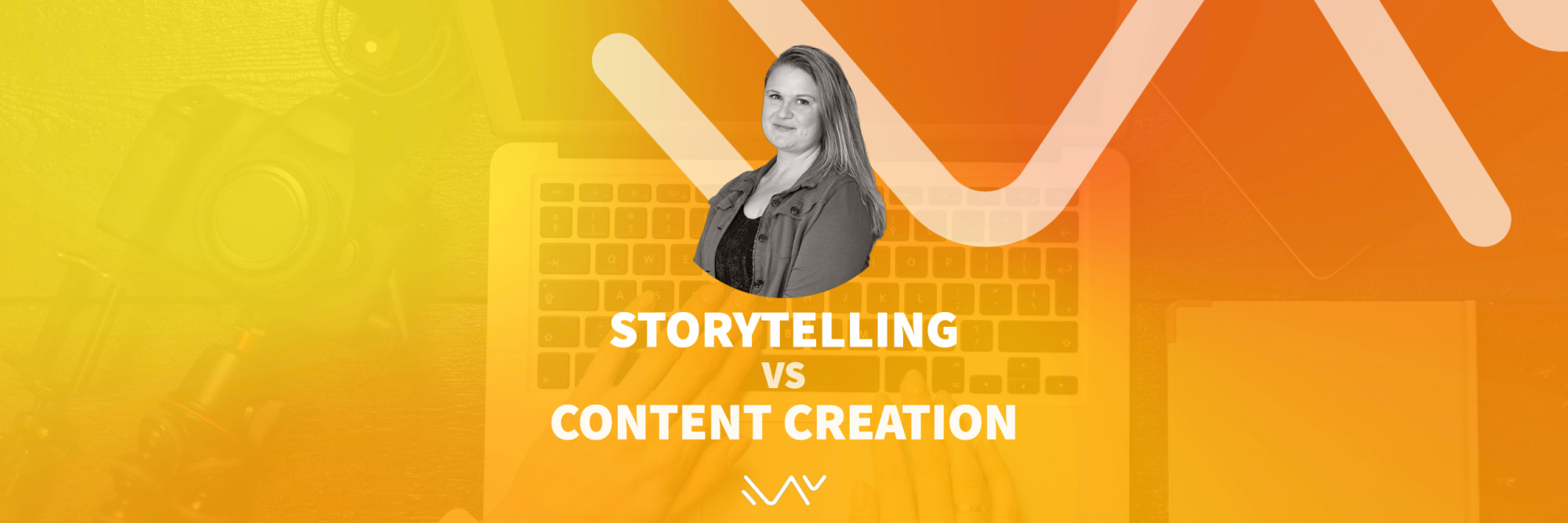//
May 12, 2022
Watermark Water Cooler | Storytelling vs. Content Creation
When it comes to content, the age-old adage "show don't tell" still applies to today's fast-paced, digital-leaning society. Learn why storytelling plays an important role in content marketing and how to 'show don't tell' with your content from Watermark's Copywriter, Nicole Hastings.
Cameron: Hello and welcome to the Watermark Water Cooler, we're talking to Nicole, our copywriter. Tell us a little bit about yourself.
Nicole: Well, I originally went to school for journalism, which is what I got my degree in. And I've been a newspaper reporter on the journalistic side, but I've also been a content copywriter as well. So using what I learned in journalism to translate over into copywriting is what I'm doing now. And I'm a mom of three kiddos. I've got twins and then another one, and I'm just busy writing when I'm not writing I'm momming. I like it.
Cameron: How do you feel about that journalism background? And now this like marketing side of things, like that's a big, like mental shift, right?
Nicole: It's about writing content, but the journalism side is too. You know, I've had some of the struggles along the way.
Cameron: We were like, oh, that shift in kind of thinking, you know, how has that, how's that gone? And what, what do you think has changed your mindset kind of from that journalism side?
Nicole: I actually think they have more in common with each other. They have more in common with each other than differences. I think it's just a matter of a perspective switch where in journalism you are sort of. An observer of the story and you're relaying that information. As a copywriter for an agency, you are not only observing what the marketing needs are and the strategy needs are.
But you are also trying to convey emotion and action with your words. Rather in journalism, you're also conveying emotion. But the person reading it is the person taking in the information and they decided what to do with it. With content writing, you're more of a guide and leading the reader into the action that you'd hope that they take, which is to find a solution.
Cameron: Learn something they haven't already. So it's interesting, but it also keeps things interesting as well, because you have to continually pivot and shift depending on who your client is and what their needs are. Yeah. Which is a good transition because now we're kind of talking about, oh, people reading stuff, like, do people read things still?
Like, you know, that's a big conversation that kind of, you hear a lot of it is like, people don't read anymore. What do you think about that? What are you, what do you feel about that? Yeah, I hear you know, complaints. Sometimes people complain, oh, kids these days don't read and studies prove the opposite where people are reading more than ever, because content is readily available all the time.
Nicole: You're reading email, you're reading text, you're reading books online. You're reading. Transcripts for YouTube videos. You're reading close captions on the train. When you can't listen to the audio where you forgot your headphones or whatever. So actually people are reading more, but the change is that there's this saturation of content that people are now in control of what they're reading and they're choosing what to ignore and what they want to.
More readily available. Yeah. I mean, and that's gotta be like driving you a little bit nuts. I know it drives me nuts a little bit. Cause we have like a goal that we're trying to get somebody to. And like we're saying, people are skimmers, they're going to go to exactly what they want. And ignore the rest, whether that's an ad or BB important content that we're trying to get them to understand.
Like why we do what we do or why the, you know, our client does what they do. So it's kind of, we've just gotten to a point of a society where it's like instant gratification. And you know, how, like, how do we solve for that, that instant gratification stuff. I know there's some strategies that we use to try and help, like.
Reading is a little bit more simple or right. Yeah. Well, in the past, I mean, before the digital age we'd have the newspaper and you'd be skipping the newspaper and there's ads right in front of your face. You can't ignore it because you got to, your eyes have to literally move past to read, continue reading.
But now they have like readers, content, readers have banner blindness. If it doesn't have anything to do with them, You don't even realize that it's there, like this pop-up ad or obnoxious banner or something like that, which isn't effective because we've evolved in, like you said, that instant gratification, if it has nothing to do with me or solving my problem or what I'm looking for at the time, like I'm not even paying attention, I'm going to click the X and move on with my day.
And I think it's not just. Using your words to get somebody to read your thing, but it's understanding that the person reading it really thinks it's psychological, just as much as I'm just a good writer. So somebody has to read this whole, if you don't know your reader, then they're not, they're not, you, you could write the best piece of content and it's not going to be in front of anybody.
If it's not getting in front of the person who needs to be reading it, which is where. SEO comes in knowing your target audience, identifying your buyer personas and all of the inbound stuff that we focus on. That's not just putting on a really loud ad in front of somebody. Yeah. It's meeting, it's meeting them where they're at in their journey.
Cameron: And then, I mean, there's some other things too. Bullet pointing content and short juicing it like making it sweet. And to the point leaving all the, like having clear headlines so that people can jump to the section that they're interested in. And that's where, again, that kind of overlaps from journalism to copywriting.
Nicole: I mean, the first thing you'll learn in any journalism class is show, don't tell. And so you can do that with fewer words. I want to say this, how can I say a whole paragraph in one sentence? It's, it's hard, but it's very hard having people like, be able to know exactly what you're talking about. You know, that first headline, that first lead that first time.
That's where the person decides is this relevant to me or am I, it's not relevant to me right now. I'm going to move on. But one of the things that you kind of were talking about that I think really leads into a good conversation. Is this like storytelling, right? Like how do we, you know, help tell somebody's story to make it, to make it more interesting and engaging.
The way I approach business and life is, you know, everyone has a story to tell. And again, that comes back to, are people gonna listen to it if they can relate or they're interested in it, or it's just really fascinating, they're going to learn something that they didn't even know. Like that's a great transition into like storytelling and how important storytelling is.
And you know, how do you show, not tell them, you know, how, how do you approach. Yeah. I think that when you're writing content, it's important to keep in mind that humans are reading your content. It's not, you're not pushing somebody to forcing somebody to do something because that's not authentic. It's not genuine.
And the person reading it can tell that they're trying to be pushed into something like push marketing. But storytelling. Comes from a different angle where you're speaking to them about them and having them see themselves in the content that you're writing is telling their story, but it not, not only tells their story, but it tells your company's story as well.
Cameron: And when those two align that's when you can find your ideal customer to engage with you or. You want to? Yeah. Storytelling is also to me, an educator, like how do we educate somebody? Like and we talk about inbound as this, like, Hey, we're nurturing you by educating you in areas that are relevant to you in your journey, on where you're at and whether that's the buying process or, you know, there's a lot of different areas that.
Nicole: Inbound can work well. And that goes back to the showing and telling instead of a big ad that says like, why this now you need this by it. And it's this, this obnoxious ad. You can also come from the perspective of letting them like your content reader, your consumer, your prospective client or leader.
Whoever's super smart and treats them like they're smart and that they can decide if they need it or not.That's not really what we're here for to force them into a decision. It's helping them make an informed decision for whatever goal we have in mind. And at the end of the day, it's solving for your perspective, clients need pain points, problems not necessarily.
Forcing them to have a problem or because that's disingenuine. And I think that consumers are super savvy these days and they can smell that a mile away. And it's just, it's not, it's not about, we said that because I think that's, that is so true. Whether it's with stock photography or content or whatever it is, I really do think that, that you can, as a consumer, we are so.
The hammer with all this stuff all the time that we've really honed in, like that's genuine or that's not genuine. Yeah. Well, think about like, if you're listening to a podcast and somebody keeps mentioning products over and over and over, like, is this person genuinely wanting to help me or do they just want me to buy a product from them?
And some people, you know, are genuine and just are affiliate marketers and that's awesome. But I think it's. Again, you have to be careful in the way you approach it and you have to be empathetic, relevant, and authentic. And I think that takes your content a long way. Like you said, whether it's images, video, blogs, videos, or yeah.
Video scripts, anything like that. I think it's really a key piece of what is going on in the world. Like we say, content is king. And there's a reason for that. But anyways, just, is there anything that you'd like, like tips or any last minute thoughts on, on content I'm here from? People like writing can be really intimidating because somebody is like, I don't know how to say this.
And I'd say my tip is if you need to write anything, whether it's a copy of the blog, don't leave a blank page. Intimidate, you just get it out first. And they say the pen is mightier than the sword, but the eraser is a pretty good weapon too, because you can always erase. You can always delete, you can always cut.
Cameron: Don't be afraid of the blank space. And if you're lucky enough, you can always have an editor like Nicole
Well, as always, thank you so much for watching the Watermark Water cooler. Thanks Nicole for joining us. As always give us your thoughts, comments, if, you know, give us a like we want to continue to build this content for our audience. If there's anything that you want to see in the next about agency life about Anything that we do really.
We'd be more than happy to shoot a video about it. And until next time we're signing out.







